- Home
- William Styron
Set This House on Fire Page 2
Set This House on Fire Read online
Page 2
The time spent in New Hampshire with my dazzling Annette was a total and sweeping catastrophe. I will deal with it only to the extent of saying that it rained, that we lasted two days, and that when we left our mountain cabin in a downpour we were unbetrothed. There were no sexual difficulties. We were just not meant for each other, we decided. Both of us put up a brave front about it all, but a love affair, like some prodigy of plastic surgery, is flesh laid on to living flesh and to break it up is to tear off great hunks and parts of yourself. I went down to Virginia feeling mournful, grim, indescribably bereft.
Of my sojourn in Virginia, however, there is a little bit more to say. Nothing in America remains fixed for long, but my old home town, Port Warwick, had grown vaster and more streamlined and clownish-looking than I thought a decent southern town could ever become. To be sure, it had always been a shipbuilding city and a seaport (visualize Tampa, Pensacola, or the rusty waterfront of Galveston; if you’ve never seen these, Perth Amboy will do), and in official propaganda it had never been listed as one of the ornaments of the commonwealth, but as a boy I had known its gentle seaside charm, and had smelled the ocean wind, and had lolled underneath giant magnolias and had watched streaked and dingy freighters putting out to sea and, in short, had shaken loose for myself the town’s own peculiar romance. Now the magnolias had been hacked down to make room for a highway along the shore; there were noisy shopping plazas everywhere, blue with exhaust and rimmed with supermarkets; television roosted upon acre after acre of split-level rooftops and, almost worst of all, the ferryboats to Norfolk, those low-slung smoke-belching tubs which had always possessed their own incomparable dumpy glamour, were gone, replaced by a Yankee-built vehicular tunnel which poked its foul white snout two miles beneath the mud of Hampton Roads. Hectic and hustling, throbbing with prosperity, filled with nomads and the rootless and the uprooted (“Upstarts,” my father said. “Son, you’re watching the decline of the West.”), the town seemed at once as strange to me yet as sharply familiar as some place on the order of Bridgeport or Yonkers. And, unhelmed, touched with anxiety, smitten with a sense of dislocation I have rarely felt so achingly before or since, I knew I could not stay there long; the fact is, I almost left on the same day I arrived, when, that evening, hunting in vague panic for a familiar scene, I wandered down to the river in the soft September dusk and instead of the broad, grassy field I had known so well (the “Casino” it had been called, shadowy at twilight with rustling sycamores, where there was a bandstand and a river view of the wide warm old James, mirroring stars: here we played baseball in the fading light and here, too, shirt-sleeved Negroes hawked peanuts and deviled crabs, until at last the tootling of clarinets faded and died, and all shut down, and lovers walked beneath the trees to the sound of sycamore balls plopping earthward in the stillness and the whistle of a freighter seaward-borne in the dark) I found a snarling Greyhound bus station and a curious squat lozenge-shaped building, greenly tiled, whose occupants numbered among them a chiropodist, a lay analyst and—of all things to tell about the fading South—an office full of public-relations counselors, or consultants.
But this is too familiar to go on about at length. In America our landmarks and our boundaries merge, shift, and change quicker than we can tell: one day we feel rooted, and the carpet of our experience is a familiar thing upon which we securely stand. Then as if by some conjuring trick, it is all yanked out from beneath us, and when we come down we alight upon—what? The same old street, to be sure. But where it once had the solid resounding sound of Bankhead Magruder Avenue—dear to all those who remember that soldier who stalemated McClellan—now it is called Buena Vista Terrace (“It’s the California influence,” my father complained, “it’s going to get us all in the end.”); an all-engulfing billboard across the way (the zoning laws have collapsed; we used to swing on grapevines there, in the ferny mornings) tells us to “Listen to Jack Avery, the Tidewater’s Favorite Disk Jockey,” and though we are obscurely moved by intimations of growth, of advancement, we feel hollow and downcast. Nor is our nostalgia misplaced. Only fools lament change in itself, but in this “pillaged town,” as my father called it, there was many a fool who on his deathbed would protest his innocence of total rape. “’Bring back the greenery, bring back the leaves!’ That’s what they’re going to holler,” my father said. “That’s what they’re going to holler when the light dims. And all they’re going to get is this here Avery.”
It must have been on the afternoon of my fourth or fifth day in Port Warwick that my father, retired now from the shipyard, took me for a long ride around town in his car. We traveled all the old avenues, many of them strange to me now (the largest and most venerable trees seem to be the first victims of a municipal renascence: not only the magnolias but the oaks and elms had fallen, in a process of rebuilding that made way for, among other things, the first Bauhaus-inspired Pentecostal Holiness church in Dixie), and we had beer and pigs’ knuckles behind the flyspecked glass of Jake Eisenman’s grill, which alone amid the Laundromats and Serv-ur-Selfs and Howard Johnsons resisted change, resisted neon and plastic and chrome, resisted sanitation and a new clientele (the old young gang was still at it, sallow-faced and now balding amid the pool cues and the verdigris-tinged spittoons, still yacking about poontang and pussy, white and dark, though now also about that contortionist legal maneuver, the pride of Byrd-land, called interposition, which would surely keep the niggers in their place), and afterwards, a touch beery and afloat in the bright September heat, we made a brief circuit of the harbor and drove slowly alongside the blue and spectacular bay. It was a clear day, slightly hazed far out where gray gigantic cruisers and tankers rode at anchor, but salt-smelling, transparent and magical, white with sparkling gulls. We went past a beach where muddy-legged boys were out digging clams, and children played on the sand within reach of plump bandannaed mothers, suntan-oiled and glistening like seals. A motorboat, soundless upon the far reaches of the water, cleft the tide between twin silver parabolas of spray. For a brief instant pleasurably lost, I felt caught up in a reverie of years long past—flapping sails and smell of tar and clamshells cool and gritty in the hand—which changeless childhood seascape, even here, even now, seemed to elude and deny the marauding clutch of progress. A stoplight halted us, precipitately: it was the old man’s spine-chilling knack always to slam on the brakes thus, with no margin for error and at the last moment of truth.
And as we stopped there, he said: “Son, you’ve been mighty down in the mouth since you’ve been home. What’s the matter? Woman trouble?”
What could I tell him? Yes and no; it was woman trouble, but it was some other trouble more profound and unsettling which was at the root of that, and, having told no one else about Sambuco, I could not force myself to speak to him about it, either. I murmured something about the humidity.
Then (psychic weatherman) he said: “I know. I know, Peter. These are miserable times.” The light changed and we heaved forth with a lurch. “They are miserable times. Empty times. Mediocre times. You can almost sniff the rot in the air. And what is more, they are going to get worse. Do you know that? Read Carlyle. Read Gibbon. Get times like these when men go whoring off after false gods, and the fourth or fifth best is best, and newness and slickness and thrills are all—and what do you come to at last? Moral and spiritual anarchy, that’s what. Then political anarchy. Then what? Dictatorship! We’ve already got one in this state,” he added, and spat out the name of that proconsul of the commonwealth whose works had kept him in a state of tense outrage for thirty years.
Rare and prodigious man, my father. Had he been born in the North I think he might very well have been an old-style radical. As it was—a good Episcopalian, whose circumstances had located him within the purlieus of the most stiff-necked parish this side of Canterbury—he had managed to work out a shaky compromise between his honest piety, on the one hand, and his enlarged human views, on the other, and the resulting tension had helped to make him the only true liberal I th
ink I have ever known. To be one of this breed in New York is childishly simple; to be one in the South surpasses all ordinary guts. He had thirsted for understanding, for wisdom, in the same way that others yearn for money or prestige, and I think that at last he had found a large measure of both. He was one of the few men in Port Warwick who had ever read a book. Age had bowed and shrunken him a bit, but not life, and he had grown larger and larger in my eyes. I have never known a more decent man, and if during these later years he became here and there cranky or sententious or overtalkative, I could understand it, knowing that the hypocrisy and meanness at which he raged had become too much even for a man of his size. “Son, life is a search for justice,” this old draftsman told me once, betraying not a flicker of self-consciousness at the immeasurable phrase. I know now that he never found it, but perhaps that matters less than that he moved through dooms of love, through griefs of joy, in his lonely seeking.
“I guess I’ve near about become a pariah in this town, Peter,” he went on (we had been in second gear for two blocks and I had to nudge him to change it); “I guess I run off at the mouth too much, but I’ve been trying to tell these people the truth for going on to forty years now. And what happens? Here’s what happens. Along comes this ignorant general with a baby-faced smile, who acquires religion and reads cowboy stories, and they vote him into office. When who was it that got them their nice houses and got them their Buicks in the first place? It wasn’t any general. It was Franklin Roosevelt, that’s who it was, whose principles and desire for a better way of life they repudiate as soon as five stars and a big grin comes along, promising them that they’ll be all right, they’ll never have to relinquish those gadgets and gimcracks they’re tied to like an umbilical cord, and they can remain fat cats forever, getting softer and more silly and stupider as the years pile up. And to top it all, that isn’t enough for them. They want everything. So on the state level they’ll still vote in year after year this millionaire apple farmer who guarantees them good roads and miserable schools and above all that the nigro will never get an even break. Ahh!” he said, grim lips set as he shook his head. “Sometimes I think the Stoics were right, maybe. A good way out is to cut your throat, if you’ve got to.”
I paid attention, turning my eyes from the bay. There was something restorative, clean—during an era of surfeit and silence —in hearing this renegade old man at the top of his wrath.
“No, I just won’t talk to them any more,” he said conclusively. “Nossir, they’ve heard the last word from Alfred Leverett, and they can go to hell in a Cadillac for all I care. I’m through with them all!” He grew red as a lobster, and he belched thunderously, and I feared for his heart.
For a while we drove in silence. Billowing white storm clouds loomed up on the far horizon, high up over the Eastern Shore, and a spindrift gray beard of rain swirled beneath them, unloosed in smoky tatters upon the sea. A white sail tilted far out, almost flattened upon the water, came erect slowly and gracefully as the cat’s paw passed, corrugating the blue. And now the car, a 1948 Hudson Hornet tottering toward senescence, had begun to set up a threatful cricketing noise somewhere deep within its vitals (I had noticed it faintly the day before), but my father, brooding still like some Jeremiah reduced to the very ash of impotence and gloom, squinted into the setting sun and paid no heed to the racket. He was a vestryman of the church. His shoulders were stooped. He wore bifocals and his nose was skinny and beaked. I saw his lips struggle and form a soundless syllable. Then just a fledgling, tentative whisper it became: scum.
“Sometimes I think this is just a nation of children,” he said, “of childish little minds. Now that Supreme Court didn’t have no more right to do what it did than I would have in telling an A-rab or a Chinaman how to run his life. It was a dumb poor thing they did, the way they did it anyway. And everyone’s going to suffer and suffer because of it. But these people down here—they don’t realize that the nigro has got to get his just payment, for all those years of bondage. Look out there, son.” He waved toward the sparkling water. “That’s where they came in, in the year 1619. Right out there. It was one of the saddest days in the history of man, and I mean black or white. We’re still paying for that day, and we’ll be paying for it from here right on out. And there’ll be blood shed, and tears.” He mopped his brow. I turned my eyes eastward. A cloud passed across the day, then all was clear again; and for an instant I thought I could see those Dutch galleons, with their black bound cargo, lumbering up toward the muddy James.
“Watch out!” I cried. He had come close to running us into a ditch. Gusts of hot dust flooded through the car, and the bird calls beneath the hood became abruptly more chaotic and sick.
“What this country needs,” he went on, regaining command, “what this great land of ours needs is something to happen to it. Something ferocious and tragic, like what happened to Jericho or the cities of the plain—something terrible I mean, son, so that when the people have been through hellfire and the crucible, and have suffered agony enough and grief, they’ll be men again, human beings, not a bunch of smug contented hogs rooting at the trough. Ciphers without mind or soul or heart. Soap peddlers! No, I mean it, son, these are miserable times and I’ve seen all of them. We’ve sold our birthright, and old Tom Jefferson is spinning in his grave. We’ve sold out, right down to the garters, and you know what we’ve sold out for? A bunch of chromium junk from Detroit put together with chewing gum and spit!” Flushing and sweating, he jammed at the floor board with his foot. “Listen to the noisy junk, will you? Absolute unregenerate shameless piece of junk.” He stamped at the floor board again. “What do you imagine’s wrong with it?” he said in a querulous tone.
“Sounds like you might need new rings,” I said, mustering a fake expertise.
“Nossir,” he said, “we’ve got to start from scratch again, build from the ground floor up. What has happened to this country would shame the Roman Empire at its lowest ebb. The founding fathers had noble dreams, you know, and for a while I guess they were almost fulfilled. Except maybe for the nigro, the common man found freedom in a way he never knew or dreamed of—freedom, and a full belly, and a right to pursue his own way of happiness. I guess it was the largest and noblest dream ever dreamed by man. But somewhere along the line something turned sour. Godalmighty!” he exclaimed, leaning forward, ear cocked. “Something turned sour. The common man he had his belly stuffed, but what was he? He wasn’t God’s noble creature no more, he was just plain common. He hadn’t grown in dignity or wisdom. All he had grown in was his gut and his pocketbook. He forswore his Creator, paying this kind of nasty mealy-mouthed lip service every Sunday to the true God while worshiping with all his heart nothing but the almighty dollar. He plundered a whole continent of its resources and wildlife and beauty. The wisdom of all the ages, all the precious teachings of his ancestors, they were lost upon him. He spat on his nigro brother and wore out his eyes looking at TV and fornicated with his best friend’s wife at the country club. He had all these here wonder drugs to prolong his life, and what happened? At the age of seventy he was an empty husk, saddled with a lot of ill-gotten lucre and a pile of guilt, terrified of death and laying down there on the sand at Miami Beach pitying himself. A husk, son! I know what I’m talking about! And do you know what? Come Judgment Day … come Judgment, the good Lord’s going to take one look at this empty husk, and He’s going to say, ‘How do you lay claim to salvation, My friend?’ Then He’s going to heave him out the back door and He’s going to holler after him: ‘That’s what you get, friend, for selling out to Mammon! That’s what you get for trading your soul for a sawbuck, and forswearing My love!’” His sad and sagging jowls were quivering with wrath, and tears of indignation swam at the corners of his eyes. I consoled him with a pat on the arm and cautioned him to take it easy; and then, at a filling station adjacent to a new housing development, I made him turn in, and we rattled to a stop with an aviary shrilling and chirping.
It was not the rings, it wa
s the oil—the old man had let it run dry. And, “Can’t run no car without oil, Mr. Leverett,” said the garageman, with a knowing wink at me, as my father got out and as I eased back in the seat, stung with memory at these surroundings. My father’s words had left me jaded and depressed. I felt unaccountably weary and worn out—old before my time—and I had a sudden sharp pang of total estrangement, as if my identity had slipped away, leaving me without knowledge of who I was and where I had been and where I was ever going. The mood lingered, filling me with lassitude, weariness, discontent. Later than I had thought now, the hour had grown dusky and faded and the pale rind of a new moon floated high up over the bay, above Norfolk and the blinking lights of beacons and great ships moored in the outbound tide. I heard tugboat whistles and now, behind me, the dull rumble and fuss of the swollen town which once long ago, even at this hour of homeward-going, was all serenity and stillness. And as I sat there, watching my father chat with the garageman (“Cousins?” he was saying in that kindly old passionate voice. “You from Nansemond too? Why, that would make the two of us cousins indeed!”) it occurred to me in a sudden burst of recollection just where it was that we had come. Because here, long before these acres of salt marsh had been reclaimed, before the coming of the gypsum-white treeless boulevards and the ranch houses and the children-crowded green suburban lawns, right here, several fathoms beneath the foundations of this Esso Servicenter, I had once been up to my knees in the cool sand-gray salt water, hunting for crawfish, and right here at the age of twelve I had almost drowned.

 Selected Letters of William Styron
Selected Letters of William Styron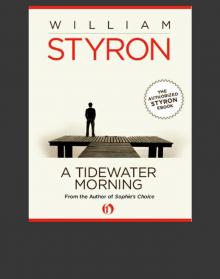 A Tidewater Morning
A Tidewater Morning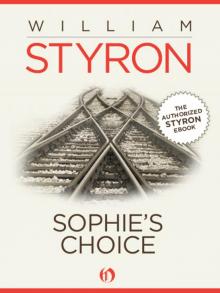 Sophie's Choice
Sophie's Choice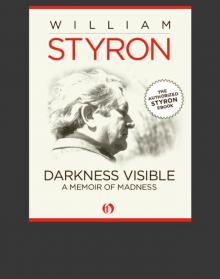 Darkness Visible: A Memoir of Madness
Darkness Visible: A Memoir of Madness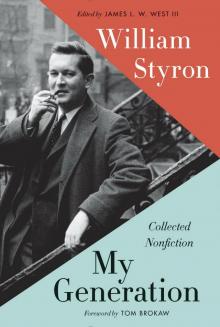 My Generation: Collected Nonfiction
My Generation: Collected Nonfiction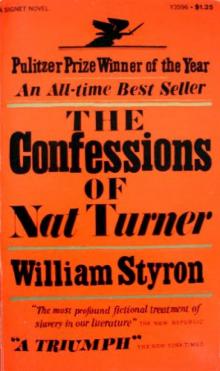 The Confessions of Nat Turner
The Confessions of Nat Turner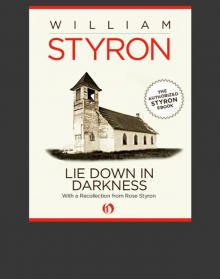 Lie Down in Darkness
Lie Down in Darkness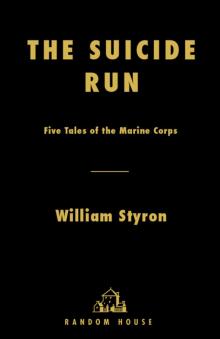 The Suicide Run: Five Tales of the Marine Corps
The Suicide Run: Five Tales of the Marine Corps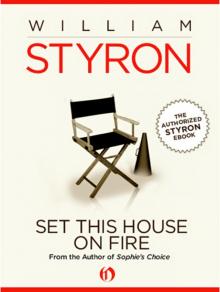 Set This House on Fire
Set This House on Fire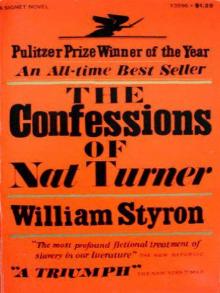 Confessions of Nat Turner
Confessions of Nat Turner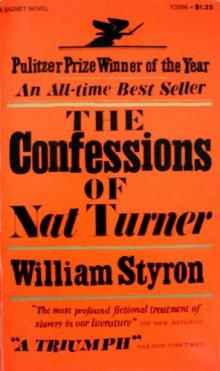 The Confessions of Nat Turner (1968 Pulitzer Prize)
The Confessions of Nat Turner (1968 Pulitzer Prize)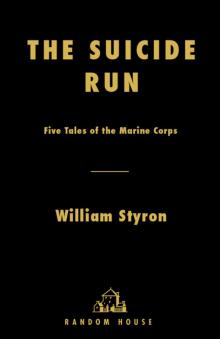 The Suicide Run
The Suicide Run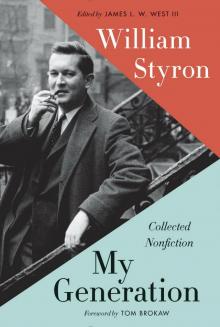 My Generation
My Generation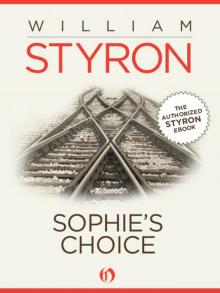 Sophie's Choice (Open Road)
Sophie's Choice (Open Road)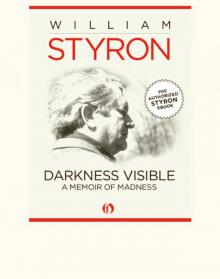 Darkness Visible
Darkness Visible